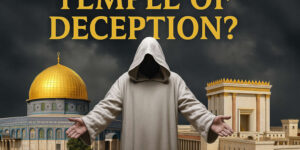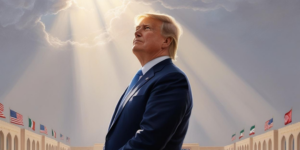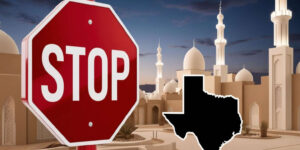The Crucial Differences Between Secular and Kingdom Churches
The objective I have in this article is to illustrate the role and function of the two ekklessias mentioned in Scripture as highlighted in the narrative of the church of Ephesus in Acts 19.
The True Ekklesia
As many of you already know and understand, the word ekklesia is used by Jesus, as seen in Matthew 16:16, to describe His followers when He launched the kingdom of God. The biblical meaning of ekklesia has to do with the community of Jesus’s disciples who permeate every aspect of culture with the gospel.
Jesus borrowed this word (that we translate “church” in English versions of Scripture) from a secular version of the ekklesia in ancient Greece, which depicted an official assembly of its citizens who come together to vote, make important decisions for their city and to enact public policy. (Consequently, the kingdom ekklesia is the called-out community of God that officially represents His kingdom on earth. Hence, the true ekklesia is the only entity that can overcome the gates of hell, because it is made up of those called to represent God to the invisible powers in heaven and its concomitant visible earthly rulers on earth.)
Jesus launched His movement in front of the gates of hell! Jesus is confrontational toward the powers of darkness and thrusts His church into the midst of the battle, as we see in His initial functional use of the term “church” (ekklesia). In Matthew 16:18, Jesus said, “And I tell you that you are Peter, and on this rock I will build my church (ekklesia), and the gates of Hades shall not prevail against it.”
The gates of hell were in Caesarea Philippi, which had the gate of hell at the bottom of Mount Hermon, where there was a cave where people offered sacrifices to the goat god, Pan. The residents of that region during the time of Jesus believed that the cave and spring water at Caesarea Philippi created a gate to the underworld. They believed their city was literally at the gates of the underworld, which was the genesis of the term “the gates of hell.”
The people of Caesarea Philippi engaged in horrible deeds, including prostitution and sexual interaction between humans and goats, in order to entice their god, Pan, to return every year. Consequently, Matthew 16 illustrates the kind of church ready and able to do battle was the ekklesia, not the typical synagogue. (The “synagogue” was the other word used in the New Testament to depict when the community of Jesus gathered together, as in Heb. 10:25.)
Since gates were the defensive and political structures in the ancient world, Jesus was saying the nature of His church had to do with attacking and undermining the ideologies and dark forces that granted earthly empires their political, economic and spiritual clout.
Standing as they were at a literal “Gate of Hades,” Jesus was commissioning His disciples to confront evil and to build the church on the very places that were most filled with moral corruption. The implications were vast. Jesus didn’t want His followers to hide from evil but to engage the evil powers of culture and overcome them through His power and the proclamation of the gospel.
The contemporary church is based on the synagogue—not the ekklesia. The typical “Attractional church” model prevalent today is built upon garnering crowds of new converts and church transplants (instead of disciples that make up the ekklesia), which is why the contemporary church is so weak and cannot stop the flood of evil invading our cities! A mere gathering place filled with crowds and not disciples can never transform a city.
This is why most mega churches have minor influence and why nations with majority evangelical Christian populations in Latin America, North America and Africa have little impact on culture. As already stated, the “assembly” mentioned in Hebrews 10:25 is the synagogue, which is merely a place to gather, sing songs and study Scripture; the ekklesia is comprised of disciples equipped to bring the gospel to every aspect of society.
The government of God is the kingdom Congress or Parliament, serving the King of kings. When we unpack the nature of the ekklesia further, we see that Jesus—who is called the King of kings (Revelation 19:16)—called His disciples the ekklesia because they were called to serve as His legislative council with His delegated authority that would overcome the powers of hell with the gospel. This is why the ekklesia is the only group with an official legislative seat with Christ in heavenly places (Eph. 2:4-6). (Taking a seat implies having an official position as a member of His governmental council as a citizen in heaven; see Phil. 3:20).
Furthermore, Jesus is referred to by Paul as the last Adam (see 1 Cor. 15:45) because Adam was the original king called to rule the earth as God’s representative. Thus, Jesus as the last Adam came to fulfill that which the first failed to do, which is to fill all the earth with godly people and influence every realm of the earth—which scholars call the “cultural mandate” of Genesis 1:28. However, the call to have dominion over the created order was not a call to have forced dominion over people; merely the plants, air, water and land mass animals, because the cultural mandate was given before the earth was populated by God’s image bearers—which is humanity (see Gen. 1:26, 27). (Otherwise we could justify human slavery if we say that the “dominion mandate” is still in effect in the church age.)
Jesus showed the application of Genesis 1:28 as the last Adam when he wrapped a towel around His waist and served His disciples and told them to love one another and that the greatest in the kingdom is the one who serves (see John 13:1-34). This explains how the church manifests the government of God, by being called to serve and love their community not take their city. Not only that, the church is called to manifest the wisdom of God to the principalities and powers of both the visible and invisible world (Eph. 3:10).
Ephesians 3:10 says, “so that now the manifold wisdom of God might be made known by the church to the principalities and powers in the heavenly places.” The word “wisdom” is the Greek word sofia, which has to do with the wisdom of God as related to His governance in the earth.
The church is the only entity called by God to represent Him by dealing with the vast complexities of this world by serving as His problem-solvers and cultural leaders, which is why He has called us to be the light of the world and the salt of the earth (Matt. 5:13-16). The true church (ekklesia) is the only entity that is seated with Christ and is strong in the Lord and able to stand against the wiles of the devil, according to Ephesians chapter 6 and James 4:7.
This is why the true church cannot blame mere worldly politicians for the decline in culture and societal problems—only the kingdom ekklesia has been equipped by God to deal with the invisible dark forces, which are the archetypes that pull the strings of the earthly rulers under the control of the evil one. However, when the church acts as though its battle is not against invisible forces but against mere flesh and blood, we mimic the social constructs of this world like the Republican Party or the Democratic Party, and we lose our effect as the government of God (see Eph. 6:10-14).
Read the continuation of this three-part article series next week.






































